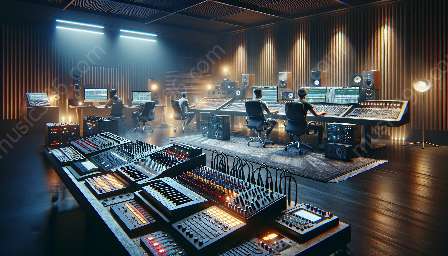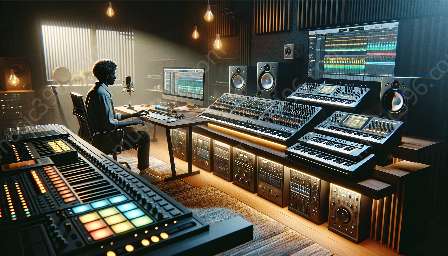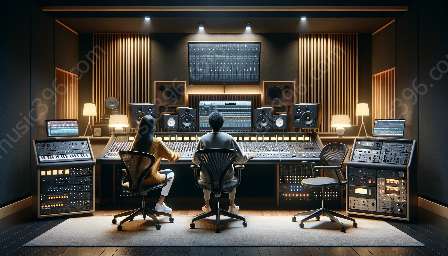In the ever-evolving landscape of music technology, digital audio workstations (DAWs) have become indispensable tools for modern music production. However, with the rise of environmental awareness, it's crucial to consider the sustainability aspect of DAWs and music production practices. This topic cluster explores the environmental impact of DAWs and sustainable solutions for music production, offering insights into how music technology can contribute to eco-friendly production.
1. Environmental Impact of Digital Audio Workstations (DAWs)
When it comes to environmental considerations in digital audio workstations, several factors need to be addressed. One significant aspect is the energy consumption associated with hardware and software used in DAWs. The increasing demand for processing power and storage capacity in DAW systems has led to higher energy consumption, resulting in a larger carbon footprint. Additionally, the electronic waste generated from outdated or discarded DAW equipment contributes to environmental pollution.
Moreover, the production and disposal of electronic components used in DAW hardware can have detrimental effects on the environment. The extraction of raw materials, manufacturing processes, and end-of-life disposal contribute to resource depletion, pollution, and electronic waste accumulation. Understanding the environmental impact of DAWs is crucial in implementing sustainable music production practices.
1.1 Energy-Efficient Hardware and Software
One approach to mitigating the environmental impact of DAWs is the development and adoption of energy-efficient hardware and software. Manufacturers can prioritize designing DAW systems that minimize energy consumption without compromising performance. Similarly, optimizing software algorithms and coding practices can contribute to reducing the energy requirements of DAW applications. Music technology companies can also promote energy-efficient practices through user education and product marketing.
1.2 Extended Product Lifecycles and Recycling Initiatives
Extending the product lifecycles of DAW equipment through upgradability and repairability can significantly reduce electronic waste. By designing hardware with modular components and providing repair services, music technology companies can promote a circular economy and minimize the environmental impact of DAWs. Furthermore, implementing recycling initiatives for DAW hardware and electronic components can ensure responsible disposal and repurposing of materials, contributing to sustainable resource management.
1.3 Renewable Energy Sources for DAW Operations
Adopting renewable energy sources for powering DAW operations can directly offset the carbon footprint associated with energy consumption. Music production studios and DAW users can consider utilizing solar, wind, or hydroelectric power to reduce their environmental impact. Additionally, advocating for sustainable energy policies within the music industry can pave the way for greener DAW operations and sustainable music production practices.
2. Sustainable Music Production Practices
Beyond the environmental considerations specific to DAWs, sustainable music production practices encompass a broader range of aspects within the music creation process. From recording and sound design to distribution and performance, various opportunities exist for integrating eco-friendly practices into the music production workflow. Embracing sustainable music production not only contributes to environmental stewardship but also aligns with the ethos of socially responsible creativity.
2.1 Efficient Resource Management
Managing resources efficiently within music production involves minimizing material waste, optimizing energy usage, and adopting sustainable practices in studio operations. From selecting energy-efficient studio equipment to implementing recycling and waste reduction strategies, music producers and recording engineers can reduce their ecological footprint while maintaining creative excellence.
2.2 Eco-Friendly Audio Recording Techniques
The art of capturing sound can be approached from an eco-friendly perspective by considering the environmental impact of recording techniques. Using environmentally conscious microphone choices, optimizing signal chains, and embracing acoustic recording environments contribute to sustainable audio production. Additionally, integrating eco-friendly acoustic treatments and insulation materials in studio spaces can enhance sound quality while reducing environmental impact.
2.3 Digital Distribution and Carbon Neutrality
As digital platforms continue to dominate music distribution, considerations for carbon neutrality and sustainable practices in digital distribution become increasingly relevant. Music technology companies and streaming services can prioritize reducing their carbon footprint by leveraging renewable energy for data centers, implementing energy-efficient data storage solutions, and committing to carbon offset initiatives. By aligning with eco-friendly distribution platforms, musicians and music producers can support sustainable music consumption and minimize environmental impact.
2.4 Ethical Sourcing and Fair Trade Practices
Encompassing the social and environmental dimensions of sustainability, ethical sourcing and fair trade practices are essential aspects of sustainable music production. From selecting ethical instrument materials to supporting fair-trade music gear manufacturers, artists and music industry stakeholders can contribute to the global movement for ethical and sustainable supply chains. By fostering transparency and accountability in sourcing practices, the music community can promote responsible resource extraction and manufacturing processes.
3. Leveraging Music Technology for Environmental Conservation
While addressing the environmental considerations in digital audio workstations and sustainable music production practices is crucial, it's equally important to recognize the potential of music technology in driving environmental conservation efforts. Innovative applications of music technology can empower creators and industry professionals to make positive contributions to environmental sustainability.
3.1 Virtual Collaboration and Remote Work
Advancements in music technology have facilitated virtual collaboration and remote work opportunities for musicians, producers, and audio engineers. By reducing the need for extensive travel and commuting, these digital music production workflows can contribute to lower carbon emissions and environmental impact. Embracing remote collaboration tools and virtual studio environments promotes sustainable practices while fostering global creative connectivity.
3.2 Instrument and Equipment Simulation
Music technology innovations have led to the development of high-fidelity instrument and equipment simulations, offering musicians and producers compelling alternatives to traditional hardware. By utilizing virtual instruments, amplifiers, and effect processors, artists can minimize the environmental impact associated with resource-intensive manufacturing and transportation of physical gear. Accessible and realistic virtual instruments also democratize music production, empowering a diverse range of creators to engage in sustainable music-making.
3.3 Eco-Aware Music Software Development
The conscientious design of music software plays a significant role in promoting sustainable music production practices. Software developers have the opportunity to prioritize eco-conscious coding practices, optimize resource utilization, and implement energy-efficient algorithms. By integrating environmental considerations into the development and optimization of music production software, the industry can support eco-friendly digital workflows and minimize ecological footprint.
3.4 Advocacy, Education, and Sustainable Innovation
Advocacy, education, and sustainable innovation are essential pillars in leveraging music technology for environmental conservation. Educators, industry leaders, and technology providers can champion sustainability initiatives, knowledge-sharing platforms, and collaborative efforts to advance sustainable music production practices. From promoting sustainable production techniques to fostering eco-innovation in music technology, collective action can drive positive change and inspire the next generation of environmentally conscious music creators.
Conclusion
The intersection of music technology, digital audio workstations, and sustainable music production practices offers a multifaceted landscape for environmental considerations and eco-conscious creativity. By addressing the environmental impact of DAWs, embracing sustainable music production practices, and leveraging music technology for environmental conservation, the music community can chart a course toward a more sustainable and eco-friendly future. Through collaboration, innovation, and a commitment to environmental stewardship, music technology and sustainable music production can harmonize for the betterment of the planet and the creative community.

























